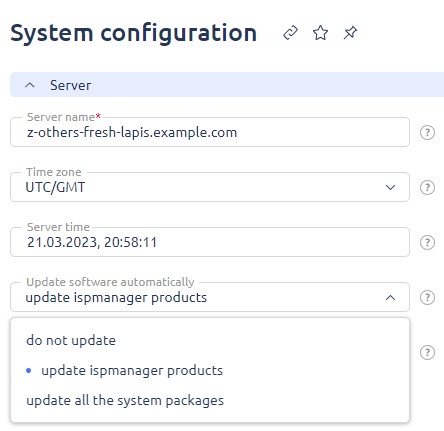Upgrade
Regular updates of a control panel ensure its correct operation. Installing updates is necessary to keep the control panel up to date.
They include:
- new functionality
- improvements of existing features
- some changes in certain operating principles
- fixes of the bugs found during the product operation
The control panel can be updated automatically (by default) or manually.
This article describes how to update the control panel.
Updates on servers with an outdated OS
Automatic upgrade
The automatic update option allows updating the software programs according to the schedule. When the automatic update is enabled, a job in the cron scheduler is started daily. Job start time in scheduler is generated randomly
To configure the automatic update log in to the control panel as root and navigate to Settings → System configuration.

- Update software automatically:
- Do not update — disable automatic updates for this control panel;
- Update ispmanager products — update automatically ispmanager software products. The system updates only the packages installed from the ispmanager repository. The packages from third-party repositories won't be updated;
- Update all the system packages — update automatically all packages of the operating system.
Manual upgrade
Allows you to update your software at the right time. Execute the following command in the console:
/usr/local/mgr5/sbin/pkgupgrade.sh coremanagerUpdating from ispmanager 5
To upgrade from ispmanager 5 to ispmanager 6:
- Purchase an ispmanager 6 license.
- If licenses for ispmanager 5 and ispmanager 6 have the same IP address:
- Connect to the server with ispmanager via SSH.
- Delete the ispmanager 5 license:
rm /usr/local/mgr5/etc/ispmgr.lic -rf - Activate the ispmanager 6 license with the key:
/usr/local/mgr5/sbin/licctl fetch ispmgr <key>
Where<key>— is the license key. - Update the control panel manually or in the Help → About program section. If your control panel version is lower than 5.295, you need to upgrade twice: first to the latest version of ispmanager 5, and then to ispmanager 6.
Check the license information: /usr/local/mgr5/sbin/licctl info ispmgr
To determine which repositories are blocking the update, run the command:
/usr/local/mgr5/sbin/pkgupgrade.sh coremanagerThe reply will contain information about the repositories:
Reading package lists...
W: GPG error:
http://dl.google.com/linux/mod-pagespeed/deb stable Release:
The following signatures couldn't be verified because the public key is not available:
NO_PUBKEY 1234567890ABCDEF E: The repository
'http://dl.google.com/linux/mod-pagespeed/deb stable Release' is not signed.If you are using the ispmanager 6 license and the control panel is blocked, you can update ispmanager via the console. To do this:
- Connect to the server with ispmanager via SSH.
- Download the update script:
wget http://download.ispsystem.com/upgrade.ispmgr5.sh - Run the script:
sh upgrade.ispmgr5.sh
Repositories
Every version has a separate repository which name matches the version name. Also, there are beta6 and stable6 repositories with all the versions of a software product. The repository defines a version the control panel can be updated to. "stable6" includes the stable and time-proved version of a software product. "beta6" includes the version that is still being tested. You can select a repository during the installation process.
Switch the repository from "stable6" to "beta6":
echo 'beta' > /usr/local/mgr5/etc/repo.version
/usr/local/mgr5/sbin/licctl fetch ispmgrFor more information on how to change the repository from "beta6" to "stable6" please refer to the article Change the repository from beta to stable.